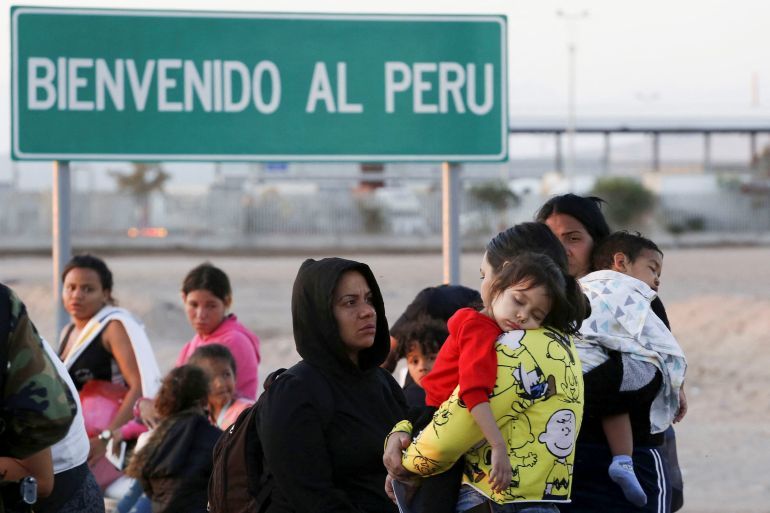People seeking to leave Chile amid increase in restrictions have been stuck in extreme climate with few supplies.
The Peruvian government is sending approximately 700 soldiers and police officers to its border with Chile, authorities have said, as hundreds of undocumented migrants seeking to enter Peru are stuck on the frontier.
The announcement on Friday comes as hundreds of people – many of whom have said they are seeking to enter Peru to continue on towards their home country of Venezuela – remain in camps on the Chilean side of the border.
Other migrants have said they plan to travel north to the United States border, and rights groups have reported that Haitians and other foreign nationals are among those stranded.
Peru’s Interior Minister Vicente Romero told local radio station RPP on Friday that about 390 police officers have already arrived at the border and 300 more soldiers would soon get there from different parts of the country.
“We are not going to allow any illegal entry, or attacks on the police,” said Romero, repeating claims by government officials that those at the border were committing crimes, with some images showing migrants pushing Peruvian border patrol officers in an effort to enter the country.
In recent weeks, Chile has ramped up restrictions on people living in the country without legal documentation, prompting an increase in the number of those seeking to leave.
Peruvian President Dina Boluarte declared a state of emergency in Tacna, a town near the border with Chile, earlier this week in response to the influx in arrivals, paving the way for joint operations by the military and police.
Chilean President Gabriel Boric Boric had deployed troops to the border in late February to help stop further crossings.
In a statement on Thursday, Amnesty International said “at least 300 people, including families with children and teenagers, pregnant women and the chronically sick” were stuck at the border and faced deteriorating conditions.
Those stranded have been living in makeshift camps for weeks in the Atacama Desert – one of the driest on the planet and an area with extremely hot days and intensely cold nights. They have reported shortages of water and basic services.
Erika Guevara Rosas, the Americas director at Amnesty International, on Thursday accused the Chilean and Peruvian authorities of “needlessly aggravating the situation, turning it into a humanitarian crisis that increases the risk to the lives and safety of these people”.
“Militarizing the borders endangers not only refugees and migrants, but also the people living in those areas,” she said in the statement.
 People stand next to a road sign reading ‘Welcome to Peru’ as migrants
remain stuck at the border, in Chacalluta area, Arica, Chile, April 27,
2023
People stand next to a road sign reading ‘Welcome to Peru’ as migrants
remain stuck at the border, in Chacalluta area, Arica, Chile, April 27,
2023
Earlier in the week, the Chilean government summoned Peruvian Ambassador Jaime Pomareda over statements made by the mayor of the Peruvian border town of Tacna.
The mayor, Pascual Guisa, had called Boric “irresponsible” and accused Chile of transferring its migration problems to the border.
Amid the impasse, the head of Chile’s lower house of Congress, Vlado Mirosevic, called for a humanitarian corridor involving all the countries in the region to resolve the crisis and allow migrants safe passage back to Venezuela.
Meanwhile, the mayor of the Chilean border town of Arica, Gerardo Espindola, had promised to provide resources to support those stranded, particularly children and the elderly.
“We will act as quickly as this critical situation affecting the people stranded at the border requires,” Espindola said.















